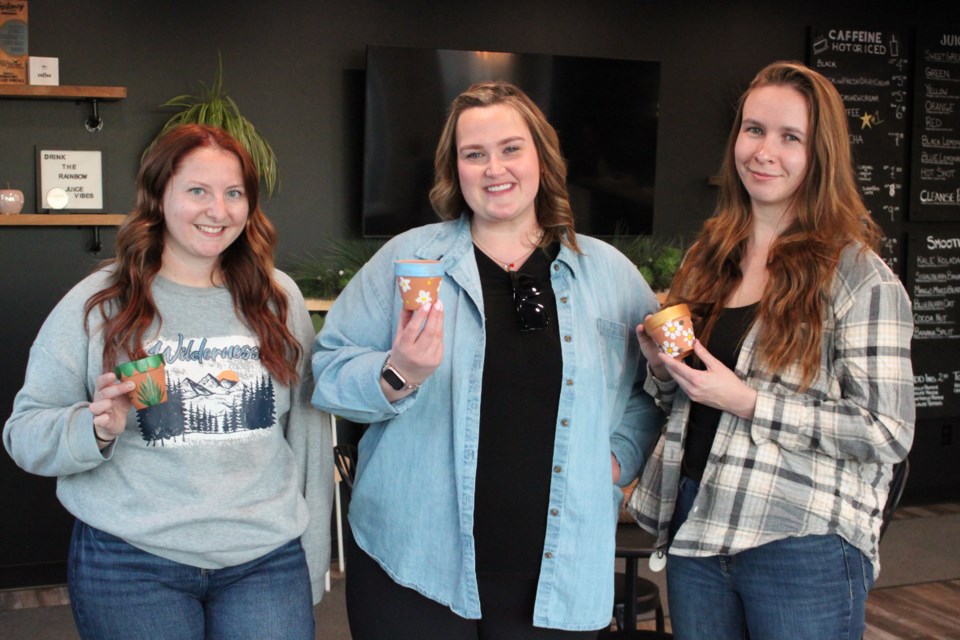BONNYVILLE – The Bonnyville and District Family and Community Support Services (FCSS) has created programming that aims to take preventative measures to encourage mental wellness, by fostering connection within the community. Free men’s and women’s events aim to create accessible spaces for people to socialize and have fun.
On May 5, The FCSS hosted a women’s night where attendees gathered to paint flowerpots together and enjoy the company of other women.
Core Juice Co. donated the space, and FCSS community programmers Heidi Debusschere and Aleesha Cabay planned the event.
“Often events are geared towards families, and there’s not a lot of women’s events that are free...We’ve had a great response from people. We will be doing these women’s nights on the first Monday of every month, and maybe even more,” said Debusschere.
Debusschere said they are able to take feedback from participants and community members and gear the programming towards what the community is asking for.
Town of Bonnyville Coun. Kayla Blanchette is not only the council appointed board chair of the Bonnyville and District FCSS, but she is also the president of the Family and Community Support Services Association of Alberta (FCSSAA), and she explained how the organization utilizes the provincial mandates, and local feedback to tailor programming for Bonnyville.
“When our board is approving programming, we connect everything back to the scope of the provincial mandate. One of the provincial priorities under the FCSS mandate is programming that addresses mental health. We have found that connectedness is something we like to tie back into for our mental health programming... we've done lots of different things, but we do find that gathering folks in the community has been successful,” said Blanchette.
The FCSS had a surplus of funds last year and decided to use the money to gather information to help shape programming. Blanchette spoke about how helpful having data about the communities' needs will be in supporting the board's decisions.
“We're currently in the process of having a social needs assessment completed for our Bonnyville and District FCSS catchment area...then next year, when we go into strategic planning, we will take into consideration what the provincial priorities are for us, see what the needs are that come out of that assessment, and then align the two so we have really intentional programming,” said Blanchette.
Blanchette said having data to support the board’s decision will be helpful
The men's nights were launched with really good uptake, and Blanchette said it was great to see the camaraderie around the room.
“They’ve done things like woodworking and a wing competition, and we’ve had a lot of buy-in from local businesses. They watched an Oilers game and one of the prizes was Oilers tickets from a local business. Recently, Imperial Oil gave us a $5,000 grant for materials for the men's and women's events, and Lakeland Co-op have helped out with the materials for woodworking,” said Blanchette.
Blanchette said structuring the men's nights as social activities, rather than mental health initiatives, can be more inviting for many.
“The difference between men and women, when it comes to mental health, is that men tend to connect shoulder to shoulder while they're doing something, and women tend to connect face to face,” said Blanchette.
Feedback was received through social media that residents would like to have a women’s night as well, so the programming was created.
“From my perspective as a woman, a working mom, and a leader in the community, we wear many hats and I think these events are just opportunities for women to get out and connect with other women, regardless of what various hats they might be wearing,” she said.
Blanchette explained that a “third space” is a sociology term used to describe a communal gathering space that exists outside the home (the first space) and work or school (the second space).
“Some folks just struggle to find that third place in their community, so this might be an avenue for them to connect with other people in the community,” said Blanchette.
The FCSS focuses on prevention through social services, and Blanchette explained that when social issues are addressed from a preventative lens, you catch them before they escalate into being more reactive or rehabilitative.
“It’s teaching folks to swim before they’re drowning.”
Blanchette said the FCSS has a long history in the community, and as a well-known organization, it can often be sought out for issues beyond its scope.
“It’s one of the blessings and curses of being in rural Alberta is that FCSS ends up being the one door that is open to anybody, so everyone floats into it. But that is the beauty of living in a small town where we know our services in our communities – we can help you navigate to where you need to go."
FCSS programming is for the whole community, Blanchette said, dispelling the misconception that services are only for the less fortunate or for those who are part of a vulnerable population.
To find information on upcoming programs, the Bonnyville FCSS has a website, and posts events on social media.



